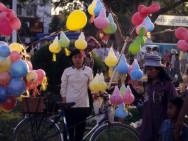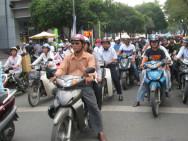Searching for Innocence: Phnom Penn 1996
I visited the country several times during this transitional period in 1996, and once lived with an NGO called CANDO, which was comprised mostly of Cambodian-Americans who had come back to help their country.
I remember in particular, evenings drinking on the porch at the Foreign Correspondence Club, the noise of the city filtering below and the cooler breezes from the Mekong River somehow making their way through all of it. Phnom Penh changed its shape several times a day, and in the early evening, the vendors would come out from who knows where, lining the already crowded streets with carts lit by a single florescent bulb, as a tangle of extension cords reached towards some undefined power source that gave the city a whole new life.
While people in other parts of the world talked about sports, family, and world events, here the talk was of projects: projects that would help the Cambodians this way or projects that would help the Cambodians that way.
What I eventually came to learn was that the people who were the most effective in providing real help in a foreign country tended to possess one common characteristic: they listened more than they spoke. What I found, too, was that for the people who spoke more than they listened, a subtle change had often occurred in the nature of their philanthropic efforts. It was not altogether uncommon for an NGO to begin its work in the service of people, but then later end up using those same people for the service of the NGO. This is a subtle distinction, but one that makes all the difference in the world. The objective of the NGO no longer was to serve a particular population in a particular way, but rather to have the needs of these people—and the quantification of such—justify the funding and mission of the organization.
These issues raised in Cambodia would remain with me through my work in other areas, but they were largely the inspiration for the thrust of “Searching for Innocence: Phnom Penh 1996.” It seemed like the play would be about the Cambodians who had endured untold sufferings, but it seemed like the more interesting subject matter was all the worlds’ good intentions run amok, a phenomena to which the Cambodian people had fallen victim again and again. Certainly the American administration at the time felt they were doing the right thing in getting involved in Southeast Asia, as did the Khmer Rouge, who thought they were creating an ideal society, as did the UN when they set up a dual-prime minister relationship, as did and do all the NGOs working to help Cambodians in one form or another. (At one point in my play, one of the NGO characters coming to terms with this phenomena points out that there are more than one-hundred NGOs present in Cambodia, and wonders out loud to a Cambodian who doesn’t speak his language, what are the one-hundred ways that the Cambodian can be helped?)
I thought there was a similar thread to all of attempts to do good, and rather than focus on the political issues inherent in earlier examples, I decided that focusing on the NGO’s would provide a more personal window into this phenomena. I had also become fascinated by the unique psychology of the ex-patriots living long periods of time away from the place they consider home, and being a part of trauma and chaos in many settings throughout the world.
While in Phnom Penh, I became friends with an extraordinary poet who, as a young man, had been taken from his home and separated from his family by the Khmer Rouge. Chath Piersath brought me to meet people whose stories seemed unbelievable. We continued the discussion in Lowell, Massachusetts, where I met with Cambodians who had been taken to the United States from refugee camps in Thailand. All of these stories were woven into the fabric of the play.
Chath appears in the play both as himself, telling his own story, and as an actor playing different types of Cambodian characters. In one section, he recalls being put on a plane to go to America after being rescued from the Khmer Rouge:
Then, from the refugee camp one day, they took me to another place with big metal birds. I had never seen these things. Then I am inside, and this thing is moving, and then it is off the ground. My stomach goes into my throat and I am vomiting. Afraid, too strange to be a dream, now. I mean, I couldn't even dream something like this up. They give me food I had never eaten—butter. It made me dizzy just to smell it. I don't know where I am going, I don't know what this thing is. How does it go up in the air? I had never seen an airplane before. The only thing that I know for certain is that with each moment, I am moving further and further away from my mother, and I know somehow that I will never see her again.
―Chath Pier Sath “Searching for Innocence.”





